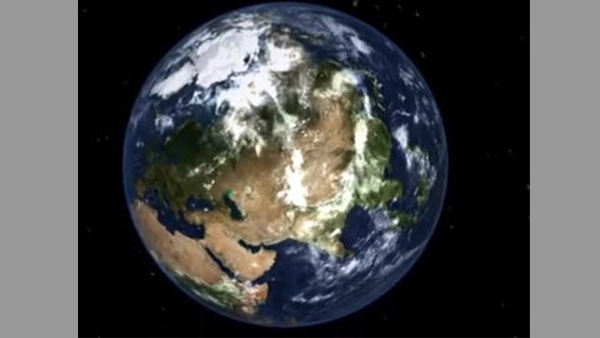
Earth’s rotation is slowing – and it could cause major earthquakes
New Delhi, July 25: What if the earth stops rotating on its axis or its rotation speed starts slowing down?
Shocking, isn't it? Yes, a recent study reveals that, the speed of the earth's rotation on its axis is slowing down, due to which the moon is gradually moving away from it. NASA scientists believe that this event could be the cause of major earthquakes.

Well, we all have witnessed several massive earthquakes in recent years, earthquakes are one of the major natural disasters that human beings have not been able to decode so far. Several reasons of the cause of earthquake including tectonic movements in the Earth's crust. Well, slowing down of the Earth's rotation can also cause the earthquakes.
Also Read | Earthquake of magnitude 3.6 strikes Maharashtra's Palghar area]
Matthew Funke, solar system ambassador for NASA's Jet Propulsion Laboratory, said that the Moon's gravity creates a tidal bulge on the Earth. This bulge attempts to rotate at the same speed as the rest of the planet.
"As it moves ahead of the Moon, the Moon attempts to pull it back. This slows the Earth's rotation down," Matthew Funke noted on Q+A website Quora. He further said, "One of the rules of the Universe is that 'angular momentum' can't go anywhere - even if individual pieces speed up, slow down, or change direction, the sum total of angular momentum cannot change."
He further added, "The Earth loses angular momentum when the Moon slows it down, so the Moon has to gain it - and it does, by moving further away in its orbit. The Moon is currently receding from the Earth by about one and a half inches per year. This could lead to major earthquakes down the line."
According to the study, the Moon is moving about one and a half inches every year. This can cause large earthquakes in the future. Roger Bilham from University of Colorado and Rebecca Bendick from the University of Montana found in their study that the number of earthquakes with intensity of seven or more have increased since the year 1900.
In the last five years of the 20th century, when there was a slight decrease in the rotation of the earth, there were more number of earthquakes with seven or more intensity. Scientists recorded 25 to 30 earthquakes every year during this time. And on an average 15 of these were major earthquakes.
An interesting twist is 2017 was the 4th consecutive year that Earth's rotation has slowed. The research team predicted more earthquakes in 2018, it was the last of a 5-year slowdown in Earth's rotation.
Earthquakes remain the most difficult natural disaster to predict. They tend to occur with little to no forewarning and can thus be incredibly destructive. According to Forbes' report, currently, the data only notes a striking correlation, but no causation. Hence, scientists are still unsure whether this change in Earth's rotation is the cause of an uptick in earthquakes.


 Click it and Unblock the Notifications
Click it and Unblock the Notifications


































